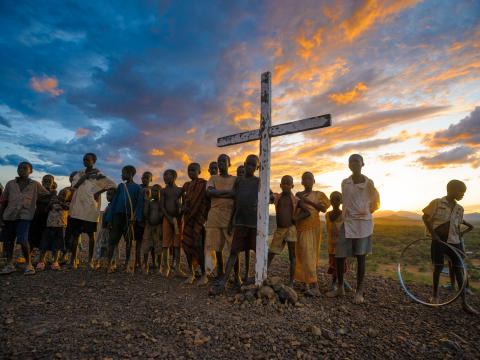Having faith in development: Why faith is key to achieving the Sustainable Development Goals

On a recent visit to Anu’s home in northeast India, I asked the girl’s mother what her dreams for the four-year-old child were. She promptly replied: “What dream can I have? We are poor and she is HIV positive.”
My work with World Vision means I am often confronted with the inability of the poor to imagine a better life. What has gone wrong? How did poverty rob the vulnerable even of their dreams?
In many places, the status of the marginalised has been ‘sanctioned’ as normal. If a community perceives poverty as inevitable and inescapable, then the poor themselves come to accept this status quo – just as Anu’s mother has.
It doesn’t have to be this way. Lasting change is possible if transformation addresses a society’s encompassing beliefs, values, ethics and principles. The question before nations is this: can we achieve the Sustainable Development Goals and end extreme poverty without addressing people’s traditions and faith?
Worldwide, more than eight-in-ten people identify with a religious group. That includes around 2.2 billion Christians, 1.6 billion Muslims and 1 billion Hindus. When faith is part of people’s identity, they look up to leaders of their faith. Often these faith leaders are also community leaders. As such, they have the power to spur far-reaching changes in people’s attitudes and behaviour. And those changes can bring extraordinary improvements in health, well-being and mindsets.
During the Ebola crisis in West Africa, for example, World Vision worked with pastors and imams who encouraged communities to amend traditional burial practices. This proved to be a crucial factor in containing the outbreak. Those who came from around the world to help soon learned that they could not treat the epidemic as a purely medical problem.
The World Bank is one organisation who has championed the role faith communities can play in eradicating poverty. In April, they invited leaders from the world’s major religions and faith-based organisations to join a movement called Ending Extreme Poverty: A Moral and Spiritual Imperative.
World Vision has thrown its weight behind the Moral Imperative. “As a global grassroots Christian organisation, World Vision welcomes the opportunity to join the broader faith community in championing the cause of the world’s most vulnerable people, especially children, as we strive to eliminate extreme poverty in this generation,” explained World Vision International President Kevin Jenkins.
Now, on the eve of the UN summit to usher in new Sustainable Development Goals, faith leaders will again have the opportunity to remind politicians and policy makers of the moral imperative to end extreme poverty, and share their extensive experience of working in the world’s hardest places to live.
The World Bank, World Vision, Islamic Relief Worldwide and leaders from diverse religious traditions will meet in New York to explore opportunities for collaboration and share a compelling vision of what’s required to achieve the Sustainable Development Goals.
The first of the new goals seeks to end poverty in all its forms. Doing this will require reaching the 1.5 billion people living in fragile and conflict affected areas – places where faith leaders often have the furthest reach. World Vision and its supporters have helped millions of the world’s poorest children living in the toughest places over many years.
Ensuring a healthy life for all is enshrined in the third goal. This is another area where organizations like World Vision can have a significant impact. In places like Zambia and Uganda, our Channels of Hope programme works with religious leaders to address the stigma around HIV. A stigma that ultimately keeps people from health and wholeness.
The fifth goal calls for achieving gender equality. In countries where female genital mutilation is practiced, World Vision has held meetings with pastors and imams to encourage communities to develop less harmful rituals to celebrate the transition into womanhood.
For World Vision, our faith in Christ is core to who we are. As an expression of God’s unconditional love for all people, we serve alongside the poor and oppressed. Our faith also provides us a unique opportunity to work for lasting change that considers the entirety of a community’s values and beliefs.
Jayakumar Christian is World Vision International’s Leader for Faith and Development. World Vision is a global Christian relief, development and advocacy organisation dedicated to working with children, families and communities to overcome poverty and injustice. World Vision serves all people, regardless of religion, race, ethnicity or gender.